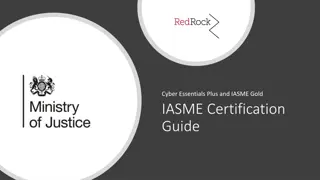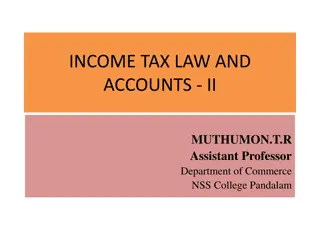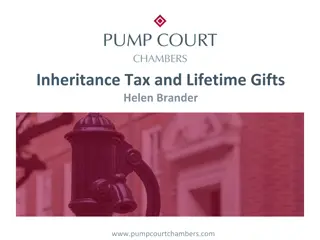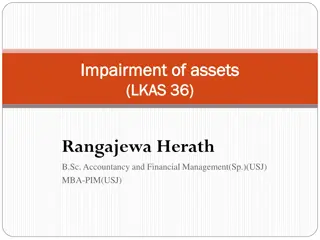Estate Planning Essentials: Passing Down Your Assets Safely
Estate planning is crucial for ensuring the smooth transfer of assets to the right beneficiaries, avoiding legal battles, and reducing expenses. Learn about the methods, requirements, and challenges of estate planning to secure your legacy effectively.
Download Presentation

Please find below an Image/Link to download the presentation.
The content on the website is provided AS IS for your information and personal use only. It may not be sold, licensed, or shared on other websites without obtaining consent from the author.If you encounter any issues during the download, it is possible that the publisher has removed the file from their server.
You are allowed to download the files provided on this website for personal or commercial use, subject to the condition that they are used lawfully. All files are the property of their respective owners.
The content on the website is provided AS IS for your information and personal use only. It may not be sold, licensed, or shared on other websites without obtaining consent from the author.
E N D
Presentation Transcript
Introduction Estate Planning simply refers to passing down of your assets from one generation to another. Assets Ancestral Self-Acquired
Avoid complications among successors Curb down legal battles Need of Estate Planning Ensures the transfer of property to right beneficiary Minimizes expenses
Methods of Estate Planning By Will Through Trust
By Will Section 59: Any sound mind major can make a will. Section 60: Guardian may be appointed by will for minority. Section 62: Will may be modified by the creator, provided his mind shall be sound during such modification. Section 63: Will shall be signed or marked by the testator. If another person signs/impresses marks on behalf of the testator, the person shall do it at the presence of the testator and follow the testator s direction. Exceptions: Soldiers. Section 63: Will shall be attested by at least 2 witnesses. Types of Will Privileged Unprivileged
Privileged Will Generally, the testators are soldiers, mariners or air force who are in expedition. The will may be written by hand, where signature or attestation is not required. In case the Will is partly or wholly written by another person and is not signed by the testator, it needs to be established that the Will is written by direction of the testator and that the testator has acknowledged it. By word of mouth by soldier/mariener/airman before 2 witnesses. Wills other than Privileged Wills are unprivileged Wills.
Testator Details and his declaration (Sound mind without coercion) Attestation by Witness and Signature/Mark by Testator Beneficiary Details Key Ingredients of Will Disposal/Division of properties; appointment of guardian for minor Appointment of Executor Property and Asset Details
Will must be registered Division of property and assets among the beneficiaries Execution of Will Demise of Testator Obtainment of Probate from Court by filing an application (213)
Challenging a Will- Grounds On grounds of intention of the testator Lack of knowledge of testator Coercion, fraud, undue influence Suspected transgression act Improper execution
Challenging a Will After Change in situation Probate: Grounds Misrepresentation before Court to obtain Probate Concealment of facts Defects in the proceedings
Process of Challenging a Will Filing Suit Before Civil Court (Fee 2% of property value) Submitting evidences, such as heir certificates, etc. Appointing a lawyer Pleadings
Validating Foreign Wills Section 382 of Indian Succession Act validates foreign wills/certificates. If a foreign will has already been proved and deposited in a competent court abroad, an Indian court is permitted to grant letters of administration ( LoA ) with a copy of the will annexed, this does away with the necessity of proof of the original will. Where a foreign will has not been proved, the Indian court is required to take evidence as to the due execution of the will according to the applicable law.
Through Trust A trust is an arrangement under which the settlor entrusts his property to the trustees, who hold it in a Fiduciary Capacity for the benefit of the beneficiaries. The basic constituents of a trust are Settlor, Trustees and Beneficiaries. The Basic tenets of Trust are transmutation of trust property, declaration of the purpose and the beneficiaries. Governed by The Trust Act. Creating a Trust Unequivocal declaration of intention Clearly defining the object Appointment of beneficiary
Hindu Law: School of Law Mitakshara Dayabhaga (West Bengal) (Entire Country Except WB
Bequesting of Property: Ancestral (Mitakshara): Hindu Law No definition and recognition of ancestral property under any enactments. Four Generation Theory Birth of Right with the birth of heir Legacy opens from the demise of owner The only property that can be called ancestral property is that which has been inherited by a person from his father, father s father, or father sfather s father. Therefore, property inherited by a person from his collaterals, such as brother, uncle, etc., or property inherited by him from a female, e.g., his mother, will be his separate property. Ancestral Property bequested by Will or Partition shall change to self-acquired property. Suman Surpur & Anr.versus Amar & Anr (Civil Appeal 188-189 of 2018) Supreme Court of India: Daughters who were born prior to the date of the introduction of the law as well are included as co-parcenor. The first preference is given to Class 1 heirs simultaneously and then the legacy is passed to class II heirs, upon the absence of class I heir
Class I Heirs Son; daughter; widow; mother; son of a predeceased son; daughter of a predeceased son; son of a predeceased daughter; daughter of a predeceased daughter; widow of a predeceased son; son of a predeceased son of a predeceased son; daughter of a predeceased son of a predeceased son; widow of a predeceased son of a predeceased son.
Class II Heirs I. Father. IV. II. (1) Brother s son, (1) Son s daughter s son, (2) sister s son, (2) son s daughter s daughter, (3) brother s daughter, (3) brother, (4) sister s daughter. (4) sister. V. Father s father; father s mother. III. VI. Father s widow; brother s widow. (1)Daughter s son s son, VII.Father sbrother; father s sister. (2)daughter s son s daughter, VIII. Mother s father; mother s mother. (3) daughter s daughter s son, IX. Mother s brother; mother s sister. (4) daughter s daughter s daughter.
Bequesting of Property-Muslim Law Property is inherited after appropriations like debt, will, expenses paid in place of a funeral are determined and paid off. Hanafi/Sunni Shia Favors Male s Heirs- Son s Son, Son s Daughter, Father s Mother No discrimination
Source of Muslim Law Holy Quran; Sunna (practice of prophet); Ijma (Consensus of the learned men of the community over the decision over a particular subject matter); Qiya (deductions based on analogy on what is right and just in accordance with good principles)
Types of Heir- Muslim Law Sharers Entitled to certain share of deceased property. Residuary Takes the share left over after sharers have taken their part.
Sharers Husband Wife Son/Daughter Daughter of a son (or a son s son or a son s son sson s) Father Paternal grandfather Mother Grandmother on the side of the males Full sister Consanguine sister Uterine sister Uterine brother Other heirs other than the Sharer are Residuaries. Further, in the presence of a Son, the daughter becomes the residuary.
Method of Share The share taken by each sharer will vary in certain conditions. For instance, A wife takes th of share in a case where the couple is without lineal descendants, and a one-eighth share otherwise. A husband (in the case of succession to the wife's estate) takes a half share in a case where the couple is without lineal descendants, and a one-fourth share otherwise. A sole daughter takes a half share. Where the deceased has left behind more than one daughter, all daughters jointly take two-thirds. If the deceased had left behind son(s) and daughter(s), then, the daughters cease to be sharers and become residuaries instead, with the residue being so distributed as to ensure that each son gets double of what each daughter gets.
Muslim Law: Shia Law Whenever a Muslim dies, his properties devolve on his heirs in definite share of which each heir becomes an absolute owner. Under Muslim law of inheritance, no distinction has been made between self- acquired and ancestral property. All properties, whether acquired by a Muslim himself or inherited by his ancestors, are regarded as an individual property and, may be inherited by his legal heirs: Abdul Raheem vs. Land Acquisition Officer, AIR 1989 AP 318. No right upon Birth. The nearer excludes the remoter.
Muslim Intestate Law: Bequesting Property M A B S1 S2 S3 S4 S5
Per Capita: Sunni M has got two sons A and B. A has three sons, S1 , S2 and S3 . has two sons S4 and S5 . When M dies there are two branches of succession, one of A and the other of B. Suppose, A and both die before the death of M so that the sole surviving heirs of M are his five grandsons. The total number of claimants (heirs) is five and the heritable property would be equally divided among all of them irrespective of the branch to which an heir belongs.
Per-Strip Distribution: Shiya The quantum of property inherited by each of them depends upon the property available to that particular branch to which they belong. In the above-mentioned illustration, A and constitute two branches, each having 1/2 of M s property. Both, A and pre-decease M. Therefore, the surviving heirs of A namely, S1 , S2 , S3 would get equal shares out of 1/2 which is quantum of property available to the branch of A. Thus S1, S2 and S3 would get 1/6 each. Similarly, the quantum of property available to the branch of is also 1/2 but the descendants from this branch are only two. Accordingly, the 1/2 property of would be equally shared by S4 and S5 . Therefore, S4 and S5 would get 1/4 each.
Muslim Law Female Rights: For men is a share of what the parents and close relatives leave, and for women is a share of what the parents and close relatives leave, be it little or much an obligatory share. Males and females have equal rights of inheritance. Upon the death of a Muslim, if his heirs include also the females then, male and female heirs inherit the properties simultaneously. Males have no preferential right of inheritance over the females, but normally the share of a male is double the share of a female. In other words, although there is no difference between male and female heir in so far as their respective rights of inheritance is concerned but generally the quantum of property inherited by a female heir is half of the property given to a male of equal status (degree). Step Children: The step-children are not entitled to inherit the properties of their step-parents. Similarly, the step-parents too do not inherit from step- children.
Christian Law: Bequesting of property Governed by Indian Succession Act; Types of Heir Lineal Descendants Kindred or Consanguinity Spouse
Obtainment of Succession Certificate Filing Application before District Court The petition seeking succession certificate shall be filed before DC as laid down under CPC, 1908. The petition shall contain the following information: 1. Death details deceased; 2. Ordinary residence of the deceased. 3. Family and other relative details; 4. Petitioner s rights; 5. Declaration Debts and certificate is applied for. Process on Application The DC shall fix a date of hearing and send notice as it feels should be given. On the fixed date, the DC proceeds in relation to the right to certificate. Upon satisfaction, the DC grants order for certificate of the Securities the
Samisti Legal, Advocates & Legal Advisors Office No. T 202, Technopolis, 1-10-74/B, Above Ratnadeep Supermarket, Chikoti Gardens, Begumpet, Hyderabad, Telangana- 500016. Contact No: +91 9553688330/ 040 40032244























